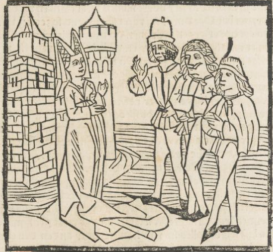The appearance of unusual or non-normative physical, intellectual, and developmental traits in newborn infants perplexed premodern medical and literary authorities. Birth defects that are today classified as congenital abnormalities resulting from genetic and environmental factors were viewed in the Middle Ages as resulting from the deception of demons, or attributed to the physiological defectiveness of the mother’s body according to the Aristotelian model. Children with malformations complicated medieval theological ideas surrounding the perfection of the human body as a creation of God and the allegorical figure of Nature as a divine agent. This project explores representations of children with congenital abnormalities as they appear in medical and romance literature and shows that to medieval authorities, they were both monstrous and marvelous.
Romance literature contains examples of many such children who live into adulthood and are endowed with superior physical strength and intellect despite, or perhaps because of, their physical impairments and their fantastic, potentially demonic lineages. Using textual and visual representations of pregnant women, themselves considered a special category of being, and monstrous births from the late Middle Ages, my project will explore the cultural implications of premodern constructions of ability and dis-ability as they relate to categorizations of the body in terms of gender and sexuality.

